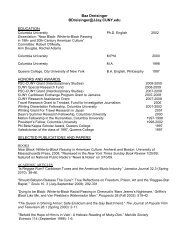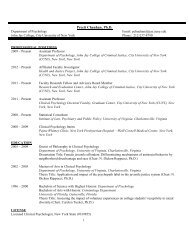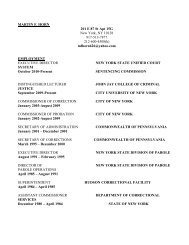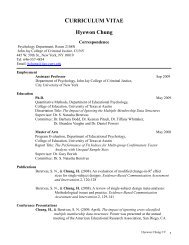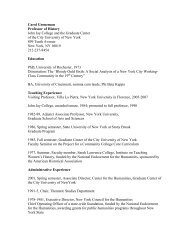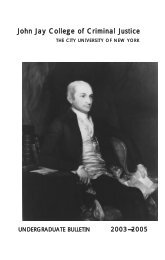Bulletin - John Jay College Of Criminal Justice - CUNY
Bulletin - John Jay College Of Criminal Justice - CUNY
Bulletin - John Jay College Of Criminal Justice - CUNY
Create successful ePaper yourself
Turn your PDF publications into a flip-book with our unique Google optimized e-Paper software.
Courses <strong>Of</strong>fered<br />
government; business cycles; money creation and the banking<br />
system; economic stabilization policies, including deficit financing<br />
and taxation; international trade, and prospects for sustainable<br />
development. Alternative theoretical perspectives are introduced.<br />
Examples are drawn from the global economy.<br />
ECO 170 Introduction to the Economics of Crime<br />
and Social Problems<br />
3 hours, 3 credits<br />
This course analyzes the links between socioeconomic conditions and<br />
crime. Paired topics include: recession and domestic violence,<br />
affluence and white collar crime, poverty and robbery/theft, youth<br />
labor frustrations and youth crime, illegal drug markets and<br />
addict/dealer crime, prostitution, unemployment and crime rates,<br />
government budgets and police spending, and income bias and the<br />
criminal justice system. Basic economic literacy is taught as part of<br />
this course.<br />
economic resources in the computation of national income and future<br />
growth; fiscal and monetary policies; capital and labor markets; and<br />
the open economy in terms of trade and currency exchange.<br />
Discussion of stabilization and market operations will incorporate the<br />
normative principles underlying measures that are essential for the<br />
efficient allocation of resources and optimal economic outcomes.<br />
Prerequisites: ENG 101, ECO 101<br />
ECO 225 Microeconomics<br />
3 hours, 3 credits<br />
Microeconomics examines how individuals, groups and businesses<br />
make decisions to allocate scarce resources and the effects of<br />
government intervention on these processes. Course topics include:<br />
utility maximization, illegal behavior, profit maximization, partial<br />
equilibrium, imperfect competition, externalities, public goods and<br />
selected special topics.<br />
Prerequisites: ENG 101, ECO 101<br />
ECO 215 Economics of Regulation and the Law<br />
3 hours, 3 credits<br />
This course examines the microeconomic theory used to justify<br />
government regulation. Business and consumer behavior is analyzed<br />
in light of government intervention. Applications include<br />
environmental regulations, occupational safety regulations, securities<br />
regulations, bank regulations and a special emphasis is placed on<br />
antitrust law.<br />
Prerequisites: ENG 101 and ECO 101<br />
ECO 220 Macroeconomics<br />
3 hours, 3 credits<br />
Macroeconomics involves the study of national economic variables<br />
such as income, saving, employment and general price level. This<br />
course is structured to give students an understanding of<br />
macroeconomics from diverse theoretical perspectives for the<br />
advanced study of macroeconomics. It considers the sustained use of<br />
ECO 231 Global Economic Development and Crime<br />
3 hours, 3 credits<br />
This course discusses the means and obstacles to attaining healthy,<br />
sustainable economic development in the globalized economy with<br />
particular attention to the role of crime. General topics include<br />
economic theory, sustainability, investment, environment, education,<br />
poverty, inequality, gender relationships, labor conditions,<br />
agriculture, urbanization and migration, and international trade.<br />
Examples of related crime topics include child labor, sweatshop<br />
labor, environmental crime, illegal economic activity, corruption,<br />
smuggling and money laundering.<br />
Prerequisites: ENG 101 and ECO 101<br />
75



